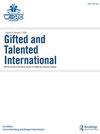The importance of being gifted: Stages of gifted identity development, their correlates and predictors
Q3 Social Sciences
引用次数: 12
Abstract
ABSTRACT Identity formation is particularly challenging for stigmatized minorities. The minority stress model (MSM) posits that both negative stereotypes and their internalization represent stressors. There is evidence that this applies to the gifted, too. However, their status is ambiguous, given that both negative and positive stereotypes exist. Furthermore, individual wellbeing also hinges on one’s identity stage, as outlined in the Cass identity model (CIM). The CIM was applied to gifted identity development in a survey of 742 high-IQ society members (16–79 years). Identity stages could be reliably and validly assessed with a new measure and were related to adjustment and coping as expected. Latent class analysis revealed four groups, which resembled the CIM, but with a few notable exceptions. Ordinal-logistic regression showed that years since first suspicion and since diagnosis of giftedness predicted group membership. In sum, identity development in the gifted examined here shows similarities with the CIM stages (which are differentially related to wellbeing and feelings toward one’s own giftedness) but has its own specific characteristics, too.天赋的重要性:天赋认同发展的阶段,它们的相关性和预测因素
对于被污名化的少数群体来说,身份形成尤其具有挑战性。少数派压力模型(MSM)认为负面刻板印象及其内化都是压力源。有证据表明,这也适用于天才。然而,他们的地位是模糊的,因为存在消极和积极的刻板印象。此外,正如卡斯身份模型(Cass identity model, CIM)所概述的那样,个人的幸福也取决于一个人的身份阶段。在对742名高智商社会成员(16-79岁)的调查中,CIM被应用于天才身份的发展。认同阶段可以用一种新的测量方法可靠有效地评估,并且与预期的适应和应对有关。潜类分析显示有四个组与CIM相似,但也有一些明显的例外。有序逻辑回归显示,自第一次怀疑和诊断为天才的时间可以预测群体成员。总之,这里研究的天才的身份发展显示出与CIM阶段的相似之处(这两个阶段与幸福感和对自己天赋的感受有不同的关系),但也有自己的特点。
本文章由计算机程序翻译,如有差异,请以英文原文为准。
求助全文
约1分钟内获得全文
求助全文

 求助内容:
求助内容: 应助结果提醒方式:
应助结果提醒方式:


